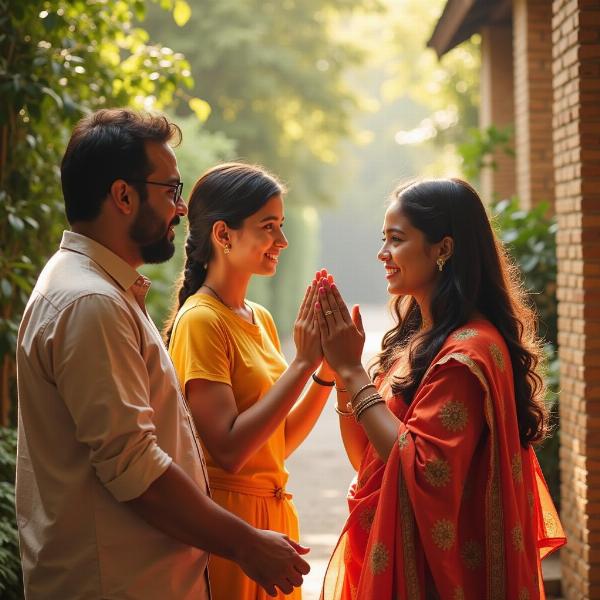Understanding the nuances of greetings and responses across cultures can be tricky. If you’ve ever wondered about the Hindi equivalent of “same to you too,” or how to respond appropriately in a similar context, this article will provide you with a comprehensive understanding of “same to you too meaning in hindi”. We’ll explore various expressions, their cultural implications, and how to use them effectively in different situations.
Understanding “Same to You Too” in English and its Hindi Equivalent
The phrase “same to you too” is often used as a reciprocal response to well wishes or greetings. While grammatically redundant in English, it conveys a sense of shared sentiment. Finding the perfect Hindi equivalent requires understanding the specific greeting being reciprocated.
Common Hindi Greetings and Responses
Hindi boasts a rich vocabulary of greetings, each with its own nuanced meaning. Let’s look at some common scenarios:
-
Scenario 1: “Happy Birthday!”
If someone wishes you “janamdin mubarak ho” (Happy Birthday), a simple “aapko bhi” (to you too) or “tumhe bhi” (to you too – informal) suffices. You could also say “dhanyavaad, aapko bhi janamdin mubarak ho” (Thank you, happy birthday to you too) for a more formal and complete response.
-
Scenario 2: “Happy Diwali!”
For “Shubh Diwali,” you can respond with “aapko bhi shubh Diwali” (Happy Diwali to you too) or “tumhe bhi shubh Diwali” (to you too, informal).
-
Scenario 3: “Happy New Year!”
To “Naya Saal Mubarak Ho,” reply with “aapko bhi naya saal mubarak ho” (Happy New Year to you too) or “tumhe bhi” (to you too – informal).
-
Scenario 4: General Well Wishes
For more general well wishes, like “Have a good day,” which translates to “aap ka din shubh ho,” you can simply say “aapko bhi” (to you too) or “tumhe bhi” (informal).
Navigating Formality and Informality
Choosing the right level of formality is crucial in Hindi. “Aap” denotes respect and is used for elders, superiors, and strangers. “Tum” is more informal and reserved for close friends and family. Using the wrong pronoun can be considered disrespectful.
Cultural Nuances of Reciprocating Greetings
In Indian culture, reciprocating greetings is a sign of respect and fosters a sense of connection. While a simple “aapko bhi” or “tumhe bhi” is often sufficient, expressing gratitude (“dhanyavaad”) adds a touch of warmth and politeness.
 Family Exchanging Greetings
Family Exchanging Greetings
Beyond the Basics: Expressing Shared Sentiments
Sometimes, you might want to express a more profound sense of shared sentiment. In such cases, you can use phrases like “bilkul, aapko bhi” (absolutely, same to you too) or “main bhi yahi chahta/chahti hu” (I wish the same for you too).
Avoiding Direct Translations
Directly translating “same to you too” can sound unnatural in Hindi. Instead, focus on conveying the underlying meaning of reciprocation and shared good wishes.
Conclusion
Understanding the meaning and usage of “same to you too” in Hindi involves more than just a literal translation. It’s about grasping the cultural context and choosing the appropriate expression to convey respect and shared sentiment. By using the phrases and guidelines outlined in this article, you can confidently navigate social interactions and express your good wishes in a culturally sensitive manner. Remember to always consider the level of formality and tailor your response accordingly. Now you have a clear understanding of “same to you too meaning in hindi.”
FAQ
-
What is the most common way to say “same to you too” in Hindi? “Aapko bhi” (formal) or “tumhe bhi” (informal).
-
Is it necessary to add “dhanyavaad” (thank you)? It’s not mandatory, but adding it enhances politeness.
-
Can I directly translate “same to you too”? Direct translations can sound awkward. Focus on conveying the intended meaning.
-
How do I choose between “aap” and “tum”? “Aap” is formal and respectful, while “tum” is informal.
-
What if I’m unsure about the formality level? Err on the side of formality by using “aap.”
-
Are there other ways to express shared sentiments? Yes, phrases like “bilkul, aapko bhi” or “main bhi yahi chahta/chahti hu” can be used.
-
Why is reciprocating greetings important in Indian culture? It’s a sign of respect and strengthens social bonds.
Meaning-Hindi.in is your premier destination for professional Hindi translation services. We specialize in Business & Commercial, Certified & Legal, Technical & User Manual, Website & Localization, Educational & Academic, Urgent & Express, and Specialized Industry translations. Our expert linguists ensure accuracy and cultural sensitivity in every project. Contact us today for a free quote! Email: [email protected], Phone: +91 11-4502-7584. Meaning-Hindi.in is here to help bridge the language gap and connect you with the world.